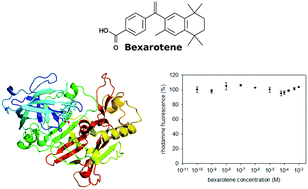Bexarotene cannot reduce amyloid beta plaques through inhibition of production of amyloid beta peptides: in silico and in vitro study†
Abstract
Recently, it has been reported that anti-cancer drug bexarotene can remarkably destroy amyloid beta (Aβ) plaques in mouse models suggesting therapeutic potential for Alzheimer's disease. However, the effect of bexarotene on clearance of plaques has not been seen in some mouse models. One of the possible mechanisms explaining this phenomenon is that bexarotene levels up expression of apolipoprotein 4 (ApoE4) leading to intracellular clearance of Aβ peptide. Therefore, an interesting question emerges of whether bexarotene can destroy Aβ plaques by direct interaction with them or by preventing production of Aβ peptides. In our previous work we have shown that bexarotene cannot clear amyloid aggregates due to their weak interaction using in silico and in vitro experiments. Here we explore the possibility of inhibiting Aβ production through bexarotene binding to β-secretase which can cleave Aβ peptides from amyloid precursor protein. Using the molecular mechanics-Poisson–Boltzmann surface area method and all-atom simulations we have shown that bexarotene has a very low binding affinity to β-secretase. This result has been also confirmed by our in vitro experiment implying that bexarotene cannot clear amyloid plaques through inhibition of Aβ production. We have also shown that bexarotene tightly binds to both peroxisome proliferator-activated receptor γ (PPAR-γ) and retinoid X receptors (RXRs). Thus, our result does not contradict the hypothesis that the reduction of Aβ plaques occurs due to bexarotene-induced overexpression of ApoE4.



 Please wait while we load your content...
Please wait while we load your content...